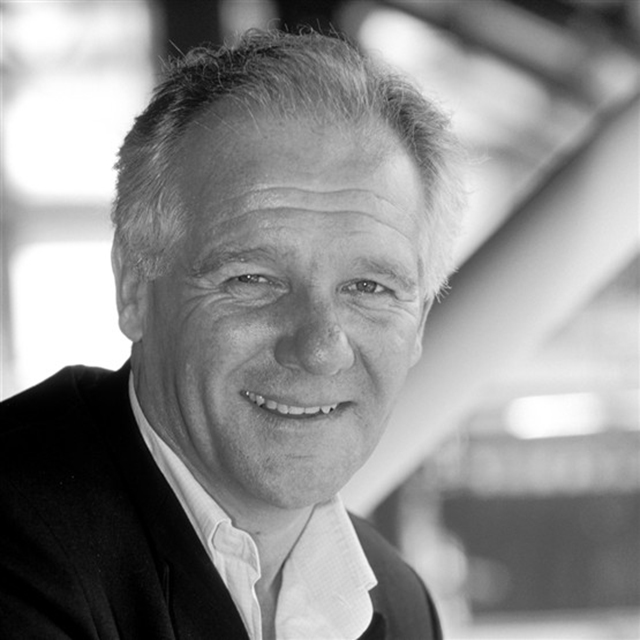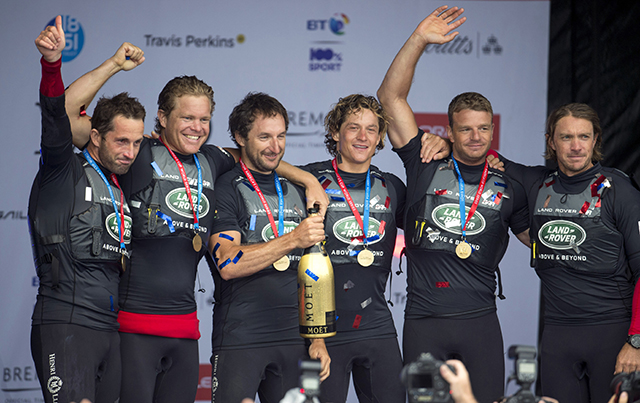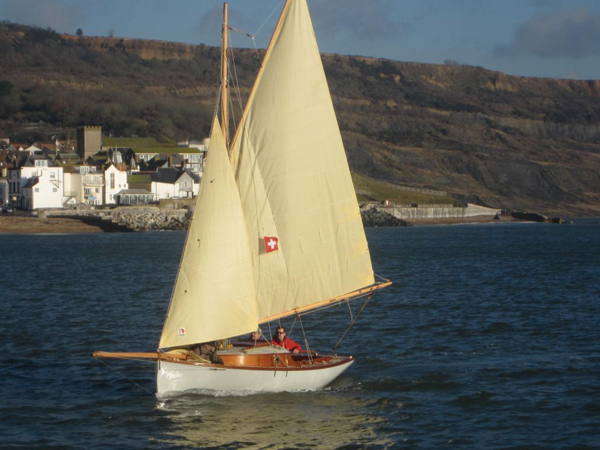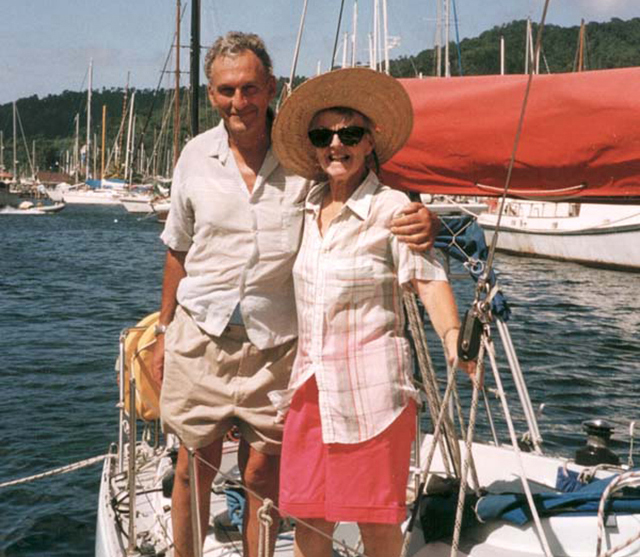"You haven't won the race, if in winning the race you have lost the respect of your competitors." Legendary sailor Paul Elvstrom has died peacefully on 7 December at his home in Hellerup, Denmark at the age of 88.
An obituary by Gary Jobson:
To be universally recognized as “the best” in any sport is extremely rare. But sailor Paul Elvstrom has earned this description. Over four consecutive Olympic Games he won four gold medals. Only three other athletes, Carl Lewis (long jump), Al Oeter (discus) and superstar sailor, Ben Ainslie have matched this feat.
But the quest for excellence was an emotional rollercoaster ride for Paul Elvstrom ranging from the highs of his record setting Olympic performances to the lows of devastating mental breakdowns. Elvstrom’s life story is a powerful example of the traumas that can afflict an intense competitor once he realizes that every competitive situation cannot be controlled.
Elvstrom’s inner strength drove his extraordinary ambition from his earliest days. He was only 20 years old when he won his first gold medal during an era when sailing was dominated by the wealthy and even royalty. Elvstrom’s approach was different.

Paul Elvstrom
To win, Elvstrom trained for months for every major regatta. He was an intuitive sailor who could feel what made a boat go fast. Physical training was his fundamental building block. He believed that if he was in better shape than his competitors, he would think more clearly. According to his protégé, Hans Fogh, who later won sailing medals for both Denmark and Canada, “Paul was very confident that he could beat everybody because of what he did training. His technique overcame any lack of speed.”
Although not a good student in school, Elvstrom studied the rules fastidiously to find clever tactical tricks. His interpretations of the Racing Rules of Sailing were first published in the 1960s and are still a must read for every racer.
On the road to Olympic glory he pioneered groundbreaking ways to win.
Elvstrom invented equipment to be more efficient on the water, designed swift sails and developed unique physical and mental training methods. Today, decades later, many of these innovations are the standard in the sailing world. His greatest victory, however, might have been his resolution of the heavy emotional toll he endured from years of self induced stress.
Elvstrom’s first Olympic gold medal took people by surprise. Paul reflected years later, “before I left Denmark (for Torbay, England) everybody said, ‘if you will not be last we’ll be happy.’ ” He got off to a bad start withdrawing from the first race because a competitor alleged that he had to avoid a collision during a close crossing situation. Elvstrom said at the time, “I felt low inside. In the next race I came in 6th and I started feeling better.”
To win the gold medal that year (1948), Elvstrom needed to win the last two races. It was very windy and he was considerably lighter in weight than the other top sailors, a disadvantage in a singlehanded dinghy. Elvstrom visualized the race in his mind the night before to be better prepared. “At that time I didn’t have trouble with my nerves that I got later. It was because nobody expected I should win.” Elvstrom won both races. His closest competitors capsized. Overnight he became a national hero in Denmark.
He realized everyone would be copying his training model in the future so he became even more creative. Elvstrom built a hiking bench with weights to simulate, on land, the rigors of sailing. This exercise machine helped build his strength and endurance. He sailed all winter in Denmark’s frigid waters. Hans Fogh recalls frequently seeing a little sail out on the horizon of the North Sea during the bleak winter months and it was always Paul.
The pressure became more intense and things started to change for Elvstrom, “The trouble with me was that I was already preparing for winning the next gold medal the day after I won the first one.”
Defending champions become marked by competitors and Elvstrom was no exception. His boats were challenged for measurement infractions and rivals constantly maneuvered against him on the water. He had to find new advances and as a result he came up with some clever ideas. For example, to get rid of water in the bilge he invented a self bailer that is used on most small boats today.
Lifejackets in the 1950s were bulky and made sailing uncomfortable so he created a “wearable” lifejacket that conformed to his body shape. And he made non-skid shoes so he wouldn’t slip on wet decks. Elvstrom’s biggest advances were in the design and construction of sails. He was so fast on the water that sailing rivals asked to buy copies of his sails.

Paul Elvstrom. Credit: Elvstrom Sails
At the time Elvstrom built houses. His wife, Anne, encouraged him to concentrate on construction as his mainstay, but he started making sails for the other racers and his business grew. So did the pressure to win.
On the water Elvstrom dominated. In 1952 he won his second gold medal at the Helsinki Olympics winning 4 out of 8 races. Four years later at the Melbourne Games he won 5 out of 8 races. There was no stopping “the great Dane.” But the fun was going away.
In 1960, Elvstrom had a life defining moment. On the way to a regatta in Belgium, his wife, Anne, was driving. His boat was on a trailer behind the car. Paul was asleep in the back seat. Then Anne fell asleep and the car rolled over. She was badly hurt.
At the time Elvstrom said, “I hated everything to do with sailing. I was so shocked I said I never would travel again with a dinghy. But after a week I was normal again and Anne slowly recovered but she lost her sense of smell and taste.” The accident was scary for him and although he thought he was “normal,” emotional scars remained.
Meanwhile the expectations for Elvstrom to win on the water continued to build. Years later he recalled what his emotions were like, “At this time my temperament was very bad and each year I had more trouble. I felt I had to win because everyone expected me to and I was scared of losing even a small race. I had so much nerves during these races that I became ill.” “I took the decision not to race anymore because of my nerves. I would only go to the Olympics in Naples (1960) and then — finish.” Elvstrom, now 32, retired after winning his fourth gold medal.
Leading up to the 1964 Olympics in Tokyo, Elvstrom served as an advisor to the Japanese Organizing Committee and as a coach for the Danish team. It was frustrating for him to watch from a small powerboat. Just before the Games he jumped in a boat for a tune-up race and won by a huge margin. It was clear he was missing the competition.
A few years later he told writer Richard Creagh-Osborne, “It was there that I got the interest in racing back. I felt that now I could compete in sailing without being nervous because when I was watching the competitors in Tokyo. I realized how stupid it was to be nervous about competing in something I love!” Paul knew it was time to get back out on the water.
With a renewed enthusiasm for sailing, Elvstrom came back stronger than ever. In 1966 and ’67 he had a remarkable run winning world championships in seven different classes. It is extremely hard to win in different kinds of boats. Whether he raced alone, with one crew, two or eight, Elvstrom won everything.
It is analogous to a track and field athlete who is able to win as a sprinter and long distance runner at the same time. There are different skill sets and strategies. Elvstrom adapted quickly to every challenge. The sailing world had never witnessed such a versatile sailor.
The list of victories was impressive. He won world championships in the two person keel boat Star class; the 505 that features two crew, with one hanging from a trapeze wire to give the light weight dinghy more stability. Usually the crew extends from the wire attached to a harness around the waist while the helmsman steers. But Elvstrom, always the innovator, steered from the wire, and won! He also won championships in the 5.5 Meter Class, the Half Ton Class, Snipes, Finns, Flying Dutchman and the Soling.
The Soling was a new Norwegian design that was created to be sailed in the Olympic Games. The sailing community was curious what the boat was like to sail. Ninety of the world’s best sailors showed up at the first World Championship – Elvstrom won that too.
One of the most successful sailors in the 60’s was John Albrechtson who had high praise for his hero, “I feel entirely confident in saying without reservation that he is the greatest small boat helmsman who ever lived. And I feel equally confident that he has done more to improve the caliber of sailing the world over than any other man.”
Canadian Olympic helmsman, designer and journalist Bruce Kirby, is one of the most accomplished and respected sailors on the waterfront. On Elvstrom Kirby says, “The tremendous effort Paul expended on shore outweighed even the brilliance of his helmsmanship; and surely this is the measure of his genius as the world’s leading sailor.”
By the age of 40 Elvstrom was considered the “Mozart of sailing.”
Whether he was conducting, playing or composing he would find extra speed and bring out the best in a crew. He made it all look easy. But the truth was the pressure on his nerves was building again.
At the 1968 Olympics in Alcapulco, Mexico, Elvstrom finished fourth in the Star class. He dismissed the defeat, “When I was racing Finns I always covered every possibility, but this time I was not going to the Olympics to win. I was going to enjoy myself, and I was scared to be too prepared in case I got my old nerves back.” He admitted he trained and tuned for the light winds forecasted in Mexico. But the wind was surprisingly strong, “I was too careless really.” He knew he could do better
For the 1972 Games in Kiel, Germany, the Olympic Committee selected the Soling, a 26 foot keel boat. It was the perfect size for an aging athlete. Elvstrom was now 44. He prepared for the Games with a vengeance. He wanted to win his fifth gold.
Meanwhile in the USA, Buddy Melges, a champion scow sailor also started racing a Soling. Melges had the best record of any American in a variety of classes. Like Elvstrom, he was versatile, smart, an innovator, a natural helmsman and trained hard.
To sailors, like me, Melges and Elvstrom were the superstars of the day. And now they would meet in the Olympics. During the summer of 1972 I worked as an intern reporter at the Asbury Park Press in New Jersey. Late at night I waited by the teletype for news about what took place in Kiel. I knew Buddy from racing scows. When I was 15, Melges showed up at the E-scow Nationals in New Jersey and won every race.
The Olympics became a test case of patriotic pride. Every sailor in America was watching to see if Buddy could defeat the greatest sailor in the world. Even today, I get tears in my eyes thinking about the match up. This was like basketball champions Larry Bird and Magic Johnson playing at the NBA finals at the peak of their careers. Or Mohammad Ali and Joe Frazier meeting in the ring for the first time.
Unfortunately the showdown was a disappointment for everyone. Melges won easily. But for Elvstrom, the stress was too much and he had another nervous breakdown. Buddy Melges told me the sad tale. In the first race, a Frenchman decided to protest Elvstrom for a rules infraction. Back on shore Elvstrom was seen uncharacteristically yelling at the protester. The next day the two bitter rivals collided on the starting line. Elvstrom couldn’t take it. He sailed back to the dock and hauled his boat out of the water. It was a crushing blow for him and the sport.
A few years later Elvstrom was recruited by ballpoint pen inventor Baron Marcel Bich (Bic Pens) to mount an America’s Cup campaign. Bich’s goal was to take the treasured Cup away from the New York Yacht Club who had held the trophy since 1851. Elvstrom built a boat for Bich and trained hard but was not comfortable working for a demanding owner and abandoned the project. America’s Cup syndicates need to be managed like corporations. There are many people involved. The management side of the program seemed inefficient to Elvstrom. Paul retreated to making sails and did not mount another campaign for years. For him, the stress wasn’t worth it.
Ten years later (1982) Paul Elvstrom and Buddy Melges met again at a Hall of Fame Regatta organized by Sailing World magazine in Newport, RI. The atmosphere was more festive than serious. I too was invited to skipper. What a special moment for me to race against the best sailors in the world including Elvstrom, Melges, America’s Cup winner Dennis Conner and 20 other champions.
In the first race I won the start. As we crossed ahead of the fleet my crew remarked, “we have Melges by one length, Elvstrom by two.” Hearing those names made me nervous. My legs started to shake. At that point I told my crew to only tell me about sail numbers, not names. That regatta was a magic moment in my career. We won. Melges was second, and Elvstrom fourth. Elvstrom was the number one vote getter in the poll to select the participants. At the regatta he received the most respect.
At the awards ceremony, Elvstrom came up to me to offer his congratulations. Meeting the master was special. I was 32, Elvstrom 55. He seemed like a man at peace with the world. Deep down I hoped I would see him race again. It seemed to me on that day in Newport he was thinking about the future.
The next year Elvstrom started racing again. This time in the speedy Tornado catamaran class. But there was a twist. He sailed with his youngest of four daughters, Trine. Together they won the European Championship which earned them a berth at the 1984 Olympics in Los Angeles. Remarkably, Paul and Trine finished fourth. They are the only father/daughter team to ever compete in the Olympics in any sport.
Fast forward to 1988. The Elvstrom duo returned to the Games. Paul was now 60 years old. I covered the ’88 Games for NBC television in the USA. NBC profiled one sailing team – Paul and Trine. In an interview for our profile, Elvstrom reflected on his nervous breakdown, “It was awful and I thought I would never be able to sail again. But I started again with my daughter and was sailing in Los Angeles where we came in fourth in the Tornado class, the fastest of all the Olympic classes. It is really a dream to sail with her. She is very fast and we are so used to each other that when we are sailing we don’t talk very much because I know what she is doing, she knows what I’m doing.”
Trine especially enjoyed the campaign, “Our relationship has changed since we started to sail together because we are very much together and we have a very good relationship, father and daughter. We talk about a lot of things.”
The wind blew hard at the South Korea Games in 1988. Too much for a 60 year old and his daughter. They did win one race but finished 15. More importantly the world had gone full circle for Elvstrom, “Now when I’m older I like faster and faster boats and that is the reason I’m sailing catamarans. But even when we are not winning we have fun. And the main thing is to compete and I’m very happy to be able to compete. But it is more fun when we are winning, that’s for sure.”
I had to smile when he said those words. Deep down winning was still important. Today Elvstrom’s philosophy serves as an important example for all athletes in every sport, “you haven’t won the race if in winning the race you have lost the respect of your competitors.”
Paul Elvstrom, more than any other sailor, has won on the racecourse, healed some painful wounds and has earned the respect of every sailor in the world as the “the best.”
Many thanks to Gary Jobson for the comprehensive tribute, as originally published by World Sailing.
Tribute from the Elvstrøm Sails team

Jesper Bank with Paul Elvstrom. Credit: Elvstrom Sails
‘We are saddened to hear that this great sailor and personality has passed away’ Jesper Bank expresses with his deepest condolences to the Elvstrøm family.
‘Pride is the first thing that comes into my mind. Having had the privilege of working with Paul Elvstrøm and some of us at Elvstrøm Sails even under his leadership has been a unique inspiration and fills us with pride.’
At Elvstrøm Sails in Aabenraa we have seen and felt his innovative approach first hand and experienced his search for excellence in everything he set his mind to. An uncompromising attitude to quality and functionality characterized Paul Elvstrøm and we are grateful to have such a heritage as our platform.
‘To me personally Paul has been a huge inspiration in our mutual passion for sailing. He has truly set his footprint into the heart of sailors all over the world and into the heart of sailing’, Jesper Bank says. ‘Paul Elvstrøm was first and last honest and genuine no matter with whom he interacted. You always knew his point of view and with his disarming manners he had his own very unique way of handling any situation.’
At Elvstrøm Sails we will do our outmost to carry on his legacy with his spirit and based on his values, making sure Paul Elvstrøm´s DNA stays in our products and our company for the future.
‘Dear Paul, we will make sure you will always be able to enjoy your proud sail loft no matter from where you will be watching and following us’, Jesper Bank ends.
Sailing World Cup Melbourne pays tribute to Paul Elvstrom

Denmark on the scoreboard at the 1956 Olympic Games
Sixty years ago, the Royal Melbourne Yacht Squadron welcomed the legendary Paul Elvstrom for the Melbourne 1956 Olympic Games.
Elvstrom claimed his third of four gold medals in Melbourne and his country name sits on the Olympic scoreboard that takes pride of place in the club room of the RMYS, part of the World Cup St Kilda Sailing Precinct.
Sailors competing at the 2016 Sailing World Cup Final arose to the sad news that the Danish sailor had sadly passed away on 7 December, thankful for the life of a man who was so influential in setting the tone for the sport of sailing. It was fitting that Elvstrom’s fellow Olympians could talk about and remember the stories that defined his career at the same venue he won his third Olympic gold.

Anne Marie Rindom. Credit: Marina Garcia/Sailing Energy/World
Compatriot Anne-Marie Rindom, a Rio 2016 Olympic bronze medallist, said, ‘This morning I read his third medal was here in Melbourne and it got me thinking what was it like 60 years ago? It’s a bit strange to be in the same place. It’s so inspiring and it makes me feel like I want to do as a well as him.’
Tonci Stipanovic, Rio 2016 Olympic silver medallist echoed Rindom’s thoughts, ‘I never knew he won his third medal right here, so being told that makes me like this place even more, and I hope I can be just like him and a win a medal here at the World Cup Final. He was at the top for a long time and to win four Olympic medals with less technology at that time, it would have been even harder to achieve what he achieved.’
As a Danish sailor it was inevitable that Rindom would grow up influenced by Elvstrom. Even though she never met Elvstrom, his impact was felt across the nation he inspired.
‘He’s a member of the Hall of Fame in Denmark and he did so many things for sailing in the country,” explained Rindom. “Both from a competitive side of the sport and people saw him as a guy who could enjoy sailing for fun, as a summer holiday and activity.
‘He was a great hero for Denmark and for the world of sailing. He inspired a lot of people. He won four gold medals and went to the Olympics eight times, that’s impressive, but he was a great man and invented a lot of things for sailing that improved the sport.’
One of Elvstrom’s inventions was the hiking strap, a piece of equipment that sailors use as an extension of their own body to improve performance. As a Laser Radial sailor, Rindom uses the piece of equipment extensively and when she realised it was Elvstrom’s creation, her admiration for the man grew even more.
‘When I started in the Optimist I was like, ‘yeah the hiking strap is just another part of the boat’ and I remember my coach said to me, ‘you know Paul Elvstrom, he invented the hiking strap.’ I was just starting in the Optimist and the hiking strap was there and I didn’t think about where it came from. I thought ‘that’s amazing. What did they do before the hiking strap?’
‘I remember at that time I came to think of him as a great man for the sport and a hero in my world.’
Tributes pour in for yacht designer Ed Dubois
From Westerlys to superyachts, with plenty in between, the career of designer Ed Dubois has been spectacular.
Designs of Ed Dubois
Ed Dubois was a good friend of PBO contributor Peter K Poland and this was probably the last and most…
Ben Ainslie’s team claim Portsmouth victory in America’s Cup World Series
Britain's chances of winning the America's Cup for the first time were given a boost at the weekend when Sir…
Tribute to Hunter Boats co-founder Warren Luhrs
The 69-year-old died suddenly of a heart attack last month
Sir Ben Ainslie launches British America’s Cup challenge
The Duchess of Cambridge supports the Ben Ainslie Racing team's proposed British America's Cup bid
Hundreds turned out to support West Dorset students’ boat launch
Eight new boats were launched by the Lyme Regis-based Boat Building Academy
Tributes paid to tragic yachtsman Roger Pratt
Condolences paid to Margaret Pratt after her husband is killed after robbers boarded their yacht in the Caribbean
Pat Manley tribute
Pat Manley, a long-time contributor to PBO and who regularly featured in our Ask the Experts pages, passed away on…
Tribute to Admiral Mary Barton
The Ocean Cruising Club (OCC) has paid tribute to its former Commodore, Admiral Mary Barton, who died on 1 December,…
Tributes paid to yacht designer Mike Pocock
Tributes paid to Mike Pocock, long-distance cruiser, yacht designer, and former OCC Commodore, who has passed away.
Tributes pour in for Andrew Simpson following America’s Cup training tragedy
The Olympic gold and silver medallist has died at the age of 36
Tributes paid to popular yachting journalist
Mike Balmforth is praised for giving a 'lifetime of dedication to the marine industry'

















